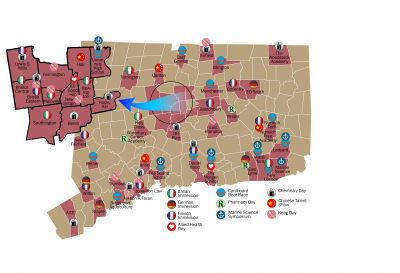By Jessica Dunn
On April 24, 2025, the UConn Early College Experience community gathered at the UConn Alumni Center in Storrs to celebrate the exceptional educators and administrators who have gone above and beyond in their roles as UConn ECE partners. The 2025 Professional Recognition Awards Ceremony honored individuals whose dedication and leadership have made a lasting impact on students and the broader ECE community.
The event opene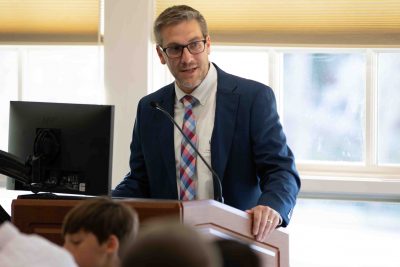 d with remarks from Christopher Todd, Executive Director of the Office of Early College Programs (OECP), and Dr. Tadarrayl Starke, Vice Provost for Undergraduate Student Success. Representing UConn’s senior administration, Dr. Starke delivered a warm welcome and expressed deep appreciation for the critical role UConn ECE instructors and administrators play in promoting student success at the high school level, while laying a strong foundation for future academic achievement.
d with remarks from Christopher Todd, Executive Director of the Office of Early College Programs (OECP), and Dr. Tadarrayl Starke, Vice Provost for Undergraduate Student Success. Representing UConn’s senior administration, Dr. Starke delivered a warm welcome and expressed deep appreciation for the critical role UConn ECE instructors and administrators play in promoting student success at the high school level, while laying a strong foundation for future academic achievement.
The evening featured heartfelt speeches, meaningful reflections, and joyful celebration as twelve professionals were recognized with the 2024–2025 Professional Recognition Awards. In addition, four long-standing partners received the prestigious Silver Jubilee Award, commemorating 25 years of service and partnership with UConn ECE.
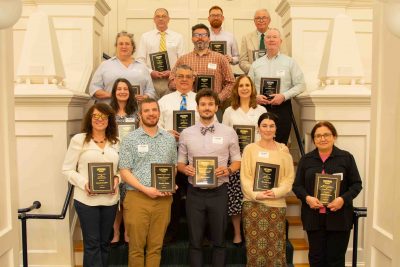
Each award recipient was nominated by colleagues, students, administrators, or UConn faculty, and selected for their exemplary instruction, leadership, and unwavering commitment to academic excellence. Their efforts consistently surpass program expectations, empowering students to thrive and preparing them for success in college and beyond.
Congratulations to all recipients of this year’s awards. Your dedication, leadership, and commitment continue to set the standard for excellence within the UConn ECE community. The UConn Early College Experience program is stronger and more impactful because of your contributions, and we are sincerely grateful for all you do.
Thomas E. Recchio Faculty Coordinator Award for Academic Leadership
Fatma Selampinar, Chemistry— University of Connecticut
Principal Award for Program Support & Advocacy
John Harris, Naugatuck High School
Site Representative Award for Excellence in Program Administration
Stephani Jones, Norwich Free Academy
Instructor Award for Excellence in Course Instruction
David Brewer, Physics— Bristol Central High School
Paul Courtois, American Studies — Rockville High School
Lisa Gardner, English— East Haven High School
Alexa Rea Kydd, English — East Lyme High School
Concetta Scarfone, Italian Literature & Cultural Studies
— Holy Cross High School
Thomas Young, Statistics — The Woodstock Academy
“Rookie of the Year” Award for Excellence in First-Year Course Instruction
Mathew Apgar, Physics — Fairfield Warde High School
Brendan Giolitto, English — Staples High School
Library Media Specialist Awards for Excellence in Enrichment & Collaboration
Kristie Kriss — Norwich Free Academy
Silver Jubilee Award
Barbara Dougan, Spanish — Glastonbury High School
James Doyle, Mathematics — Hall High School
Douglas Hutton, Physics — Glastonbury High School
Albert Wallace, Physics — St. Paul Catholic High School
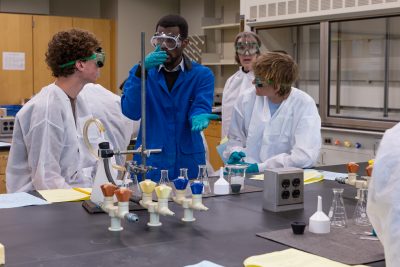 2025, the event provided students with immersive, hands-on laboratory experiences that offered exposure to UConn lab environments and research practices.
2025, the event provided students with immersive, hands-on laboratory experiences that offered exposure to UConn lab environments and research practices.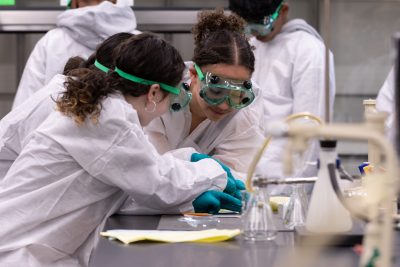
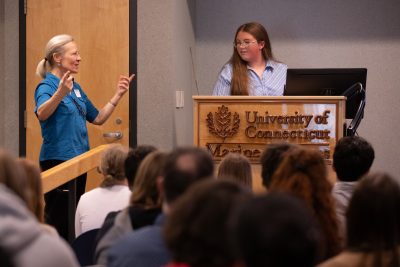 nic shores of Long Island Sound, the symposium provided an inspiring platform for high school students enrolled in UConn’s ECE Marine Science courses (MARN1001E: The Sea Around Us and MARN1003E: Introduction to Oceanography with Lab) to showcase the results of their year long research projects. Six schools participated in this year’s event: University High School of Science and Engineering, Marine Science Magnet High School, Waterford High School, Ledyard High School, The Morgan School, and The Sound School.
nic shores of Long Island Sound, the symposium provided an inspiring platform for high school students enrolled in UConn’s ECE Marine Science courses (MARN1001E: The Sea Around Us and MARN1003E: Introduction to Oceanography with Lab) to showcase the results of their year long research projects. Six schools participated in this year’s event: University High School of Science and Engineering, Marine Science Magnet High School, Waterford High School, Ledyard High School, The Morgan School, and The Sound School.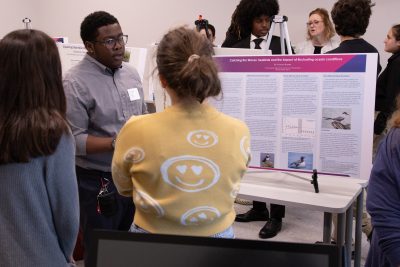 Events like the Marine Science Symposium exemplify the power of experiential education. Students walked away with more than just academic credit—they gained confidence, presentation skills, and a genuine sense of belonging in the scientific community. Their work was not only ambitious and well researched but also impressively presented, showcasing a high level of professionalism and dedication.
Events like the Marine Science Symposium exemplify the power of experiential education. Students walked away with more than just academic credit—they gained confidence, presentation skills, and a genuine sense of belonging in the scientific community. Their work was not only ambitious and well researched but also impressively presented, showcasing a high level of professionalism and dedication.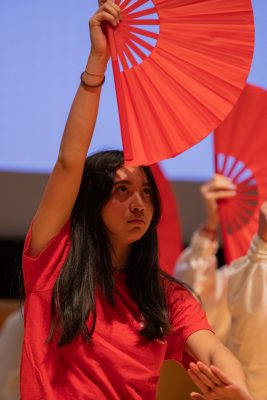 By Dr. George Chunsheng Yang | Photos by Gordon Daigle and Mike Illuzzi
By Dr. George Chunsheng Yang | Photos by Gordon Daigle and Mike Illuzzi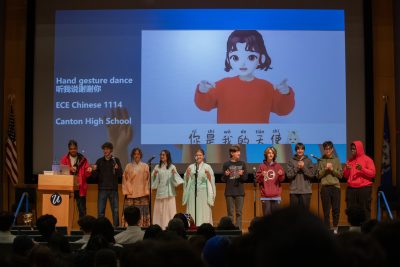 ia sessions, keeping the audience entertained and engaged throughout the event.
ia sessions, keeping the audience entertained and engaged throughout the event.